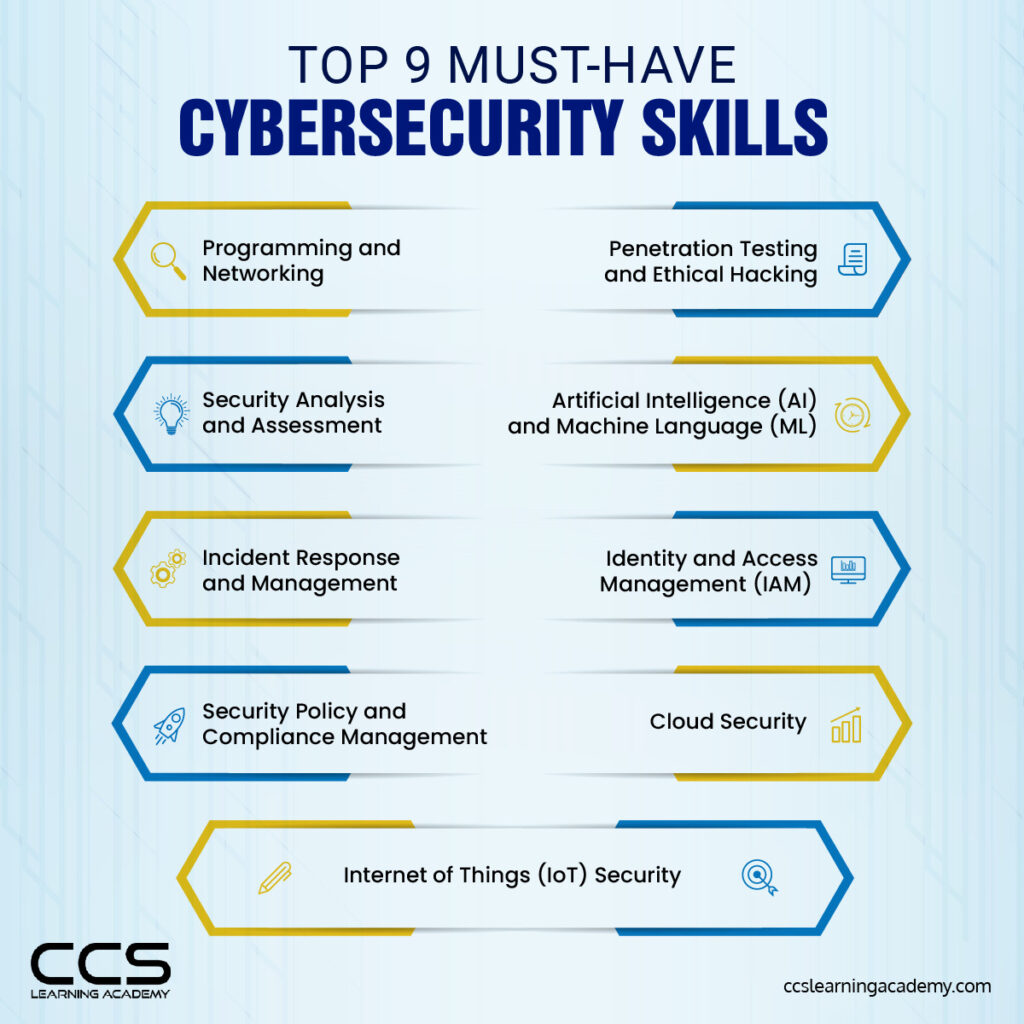Top 9 In-Demand Cybersecurity Skills You Must Have In 2023
- -
- Time -

Cyber crimes are at their peak due to the advancement of technology. Today, many governments, as well as private organizations, are affected by data breaches and cyber-attacks. This is one of the reasons why the demand for engineers who can create safe and secure applications is expected to grow by 34% in the coming years.
The breach may affect the organization’s economic, regulatory, and reputational losses. All organizations need modern tools in this digital age. The tools will help them deal with these cyber attacks.
Organizations and IT professionals must adopt advanced cybersecurity to prevent and fight against these cyber threats. For this, the industry needs skilled candidates with cybersecurity skills. These professionals will help the industry protect its systems, digital assets, and networks. The demand for professionals with cybersecurity expertise is increasing day by day. So, to be a security expert, you must learn top cybersecurity skills that are in demand.
– TABLE OF CONTENTS
- Must-Have Cybersecurity Skills to Learn
- 1. Programming and Networking
- 2. Security Analysis and Assessment
- 3. Incident Response and Management
- 4. Security Policy and Compliance Management
- 5. Penetration Testing and Ethical Hacking
- 6. Artificial Intelligence (AI) and Machine Learning
- 7. Identity and Access Management (IAM)
- 8. Cloud Security
- 9. Internet of Things (IoT) Security
- Conclusion
- FAQs
Must-Have Cybersecurity Skills to Learn
Stay ahead in the ever-evolving world of cybersecurity with these must-have skills for career success. As the digital landscape becomes more complex, mastering these essential cybersecurity abilities will open doors to exciting opportunities and ensure you remain a valuable asset in the industry.

1. Programming and Networking
To land a job in cybersecurity, you must have a solid understanding of networking and IT. Here are some necessary technical skills.
Understanding of networking and protocols
You must know system administration and high-security control placement to protect digital data from cyber threats. Analyzing network traffic and identifying anomalies are the most important skills for cybersecurity. You should be familiar with DNS services, TCP/IR network concepts, routing, etc.
Operating system and software proficiency
Proficiency in operating systems like Linux, macOS, and Windows also improves your skill set. You should also know various common software tools like antivirus and firewalls.
Programming and scripting skills
Programming languages like Python, Java, C++, etc., and scripting languages like Bash, Powershell, etc., will enhance your cybersecurity expertise.
2. Security Analysis and Assessment
To get hired as a cybersecurity expert, you must fill your basket with in-demand cybersecurity skills.
Risk and vulnerability assessment
Security analysis and assessment skills will help you manage risk and assess vulnerabilities in the system. Conduct an in-depth risk and security assessment to identify the system’s weaknesses and threats, and try to convert them into strength and opportunities.
Penetration testing and security auditing
Security auditing and penetration testing are other fundamentals that will help you discover the errors and vulnerabilities in the system and allow you to fix security postures and weaknesses.
You can acquire these skills with PTE-Certified Penetration Testing Engineer eLearning and ISSA-Certified Information Systems Security Auditor courses.
Once you fix the vulnerabilities, conduct an ethical hacking to ensure robust security, which prevents hacking into the system and gives high protection.
3. Incident Response and Management
An immediate response will help minimize damage to the organization. Before responding, a proper investigation and recommendations must be made to eliminate loopholes in the security posture.
Identify and respond to security incidents
You must have the skill to create effective Incident Response Plans (IRPs) and protocols to mitigate risk. You should better understand the incident management life cycle before implementing this plan. Implement the protocols correctly after you have identified and prepared your security incidents.
Forensic analysis and evidence collection
As incident handling skills require proper investigation, you can investigate the matter using your forensic skills. This forensic analysis will help you gather evidence from corrupted or tampered data on any device.
Being a digital forensic professional will give you a wider scope to work in cybersecurity. It requires top cybersecurity skills to make strong data interpretations and investigations to present the evidence in court and help organizations recover from breaches or cyber theft.
4. Security Policy and Compliance Management
Having knowledge of security policies is necessary for cybersecurity professionals. Following are some key skills related to security policy and compliance:
Knowledge of security policies and structures
A good understanding of industry standards is a must. Industry standards are basically industry regulations to align strategies with business objections and ultimate goals.
Before putting them into practice as security policies, you should be able to create solutions and strategies that support business goals.
Compliance management
Continuous monitoring of the system to determine whether it complies with security standards is known as compliance management. This investigation makes sure that no data has been compromised and that the standards adhere to legal requirements such as HIPAA, ISO 27000 series, NIST RMF, GDPR, etc.
Every organization aims to improve its compliance standards, which is where the cybersecurity expert comes into play. A good professional will help organizations frame security policies and automate compliance management to ensure no data breaches.
5. Penetration Testing and Ethical Hacking
Hacking may sound illegal, but Penetration Testing or Ethical Hacking is a common and legal practice. In order to make computer systems, networks, and applications more secure, these cybersecurity techniques look for their weaknesses.
Penetration testers, also referred to as ethical hackers, simulate real-world cyberattacks in order to assess an organization’s security posture and identify potential vulnerabilities before malicious actors exploit them.
The testers employ a variety of tools and methodologies to identify flaws, exploit issues if any, and make actionable recommendations to strengthen barriers.
This practice is important in order to stay a step ahead of cyber threats, and safeguard sensitive data, maintain regulatory compliance, and build trust with customers and stakeholders.
6. Artificial Intelligence (AI) and Machine Learning
Artificial Intelligence is an innovation widely adopted by organizations. The future of cybersecurity with AI is promising, offering reliability and consistency. AI aids cybersecurity experts in detecting unauthorized activities on systems.
Machine learning also plays a crucial role in cybersecurity by enhancing threat detection and response capabilities. By continuously learning from new data and adapting to evolving threats, machine learning helps cybersecurity professionals stay one step ahead of cyber attackers.
Explore AI and ML in cybersecurity
AI and machine learning bring an automation level to the threat detection that go unnoticed under human supervision. With its ability to analyze vast amounts of data and identify patterns, machine learning models can identify anomalies and potential threats that might go unnoticed by traditional rule-based systems.
Opportunities for AI specialists in cybersecurity
The cybersecurity world is buzzing with demand for AI specialists. These experts boast an impressive understanding of the cyber landscape.
As AI continues to gain traction, both private and public organizations eagerly seek their skills, promising a wealth of career opportunities.
7. Identity and Access Management (IAM)
IAM is a web service that allows you to get secure control access to AWS resources. Having IAM skills will help you manage permission for control access from the center.
Role of IAM
IAM is a framework that improves electronic or digital identity management. Following are the benefits of acquiring IAM skills.
- You will be able to control access to any key resources of the organization centrally.
- You will have the authority to grant access and manage authorization of any data or electronic identities.
- Critical information will be under your supervision, where you can work as Information Technology (IT) managers.
- IAM will enable cost-saving factors, ensure regulatory compliance, and simplify the customer’s work by giving them a better experience.
Best practices for IAM solution implementations
Some of the best practices for using IAM solutions are:
- Multi-factor authentication (MFA) for privileged users
- Root account (lock away access keys)
- Groups to assign permissions for users
- Strong passwords to enforce users’ policy
- Set permissions across multiple accounts.
8. Cloud Security
Organizations have identified solutions against data loss or theft by storing it in cloud-based security. It prevents future loss or theft, but simultaneously, it is important to keep them secure against any cyber theft or attacks. Therefore, organizations need cybersecurity professionals with top cybersecurity skills to protect those cloud data.
Understanding challenges of cloud environment security
To deal with cloud-based data protection, you should better understand cloud environments. This includes policy implementation techniques and technologies to protect cloud-based systems.
Cloud computing and management require skills that can protect them from various unique challenges, such as:
- Data security and privacy
- High dependency on Network
- Reliability and availability
- Performance and flexibility challenges
- Multi-cloud environment
- Lack of expertise and knowledge in cloud computing
Cloud data protection
Building secure systems involves better experience and knowledge in big platform management. If you have experience managing Microsoft Azure, AWS, or Google platforms and are skilled in application development security, you’ll have a lot of opportunities.
To overcome these challenges, cybersecurity experts must adopt best practices like:
- Secure the applications
- Enable security posture visibility
- Assess vulnerabilities
- Use IAM and monitor the misconfigurations
Cloud security certification and training
Some of the relevant certifications and training you can take to acquire the skills required for cybersecurity jobs are:
- CSO-Certified Cloud Security Officer
- CCSP (Certified Cloud Security Professional)
- AZ-04: Microsoft Azure Administrator eLearning.
- Architecting on AWS -Accelerator
9. Internet of Things (IoT) Security
As per a recent study, there will be more than 30.9 billion IoT devices worldwide by 2025. With the increase in devices, there will be an increase in opportunities for security experts. Shortly, organizations will prioritize IoT security to maintain their integrity across the internet system.
IoT devices will collect the personal data of consumers through sensors, due to which organizations will require experts to preserve their data.
IoT security training programs
Cybersecurity professionals with in-demand cybersecurity skills will protect the connected devices and be able to access the networks, keeping out unauthorized intruders.
Cybersecurity experts will ensure the safety of connected devices and minimize the risk associated with IoT devices.
Conclusion
Developing a strong cybersecurity skill set is vital to expand your career horizons. Learning all these must have cyber security skills allows you to make informed decisions and implement effective solutions to prevent any cyber-attacks.
As organizations strive to avoid the risks of data loss and cyber attacks, the demand for cybersecurity professionals is surging. Job opportunities in this field are projected to increase exponentially over the next five years, making cybersecurity certification courses all the more essential to stay competitive in this ever-evolving landscape.
You can take relevant courses and build your career in cybersecurity with our CISSP Exam Preparation Course. If you are looking to upskill your team with customized cybersecurity training, check out our Level Up 360 group training program.






